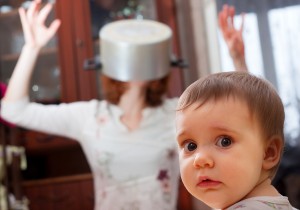 What do I do when I have a “bad mother” moment? What can we do instead of losing our temper?
What do I do when I have a “bad mother” moment? What can we do instead of losing our temper?
Here’s the short answer: try to be more mindful. In the heat of the moment, I may feel like I’m losing my mind, but really I’ve lost my mindfulness.
What is Mindfulness, Really?
Like gratitude, altruism, and strong social ties, mindfulness is definitely a part of the happiness Holy Grail. Jon Kabat-Zinn, the scientist who first “translated” Buddhist practices of mindfulness into a secular program, defines mindfulness as the “awareness that emerges through paying attention on purpose, in the present moment, and non-judgmentally to the unfolding of experiences moment by moment.”
You can try being mindful right here, right now. What are you feeling in your body right now? What themes do your thoughts keep returning to—can you notice and label them? Mindfulness is not necessarily a lack of emotion or a state of total calm. We can be feeling furious and pay mindful attention to that experience. Nor is mindfulness necessarily the suppression of thought, or an altered state of consciousness. Mindfulness is often a running conversation with ourselves, describing our experiences as they are happening: I am feeling really frustrated with Fiona…. And then stepping back to label: …frustrated, frustrated. I’m not dealing with her behavior. Denial, not dealing. I just want to get done with this grocery shopping and get out of here. I want her to stop taunting her sister. Wanting, wanting. Notice the lack of judgment that is a part of Kabat-Zinn’s definition: I’m reporting what is, not chastising myself for feeling angry at my daughter or for not dealing with her bad behavior.
Parenting Mindfully
Practicing mindfulness doesn’t just lead to decreased stress and increased pleasure in parenting, but it also brings profound benefits to kids. Parents who practiced mindful parenting for a year were more satisfied with their parenting skills and their interactions with their children—though no new parenting practices beyond just being mindful had been taught to them. Amazingly, over the course of the year-long study, the behavior of these mindful parents’ kids also changed for the better: they got along better with their siblings, were less aggressive, and their social skills improved. All their parents did was practice mindfulness!
So how do we parent mindfully? It takes constant practice. I am well-trained in mindfulness practices, but I still struggle. An example of real-life unmindful parenting: the other morning everyone woke up late, and Molly was making us even later. Instead of getting dressed she was drawing. I called from the other room, “Did you feed the dog?” which prompted her to go get her pet rat out of the cage. Without actually taking note of the situation—without any mindfulness, that is—I became more and more irritated with her.
I started to bark orders. “Molly! Get dressed!” And then I let loose a doozy: “Molly! What is up with you!? It is like you are 3 years old, not 6! Do I need to come in there and dress you myself?” For the record, I’ve never found insulting my children to be particularly effective, and it didn’t work this time, either. She flew into a rage, screaming things like, “I’m not going to listen to you if you use mean words!”
If I could rewind the morning and begin more mindfully, things would have been entirely different. All I really needed to do was to take stock of the situation: notice my feelings of anxiety and exhaustion. Notice that Molly’s exhaustion was also making her distractible and emotional, and gently help her stay focused rather than boss her around.
Accepting the situation non-judgmentally—rather than futilely trying to force it to be something other than it was, or chastising myself for sleeping through the alarm—would have left me open to more productive and positive alternatives.
For me, the keys to mindful parenting are as follows: first, notice what is happening (and what you’re feeling and thinking) and second, accept what is going on without judgment.
If you want to become a more mindful parent—and reap the incredible benefits that come along with it—I highly recommend Myla and Jon Kabat-Zinn’s book on this subject, Everyday Blessings: The Inner Work of Mindful Parenting, pre-order Shauna Shapiro’s new book Mindful Discipline: A Loving Approach to Setting Limits and Raising an Emotionally Intelligent Child, or if you are a new mother, Cassi Vieten’s book Mindful Motherhood. For additional support, check out Mindful Parenting, my online class that teaches how mindfulness can not only make you happier but your kids less stressed.
